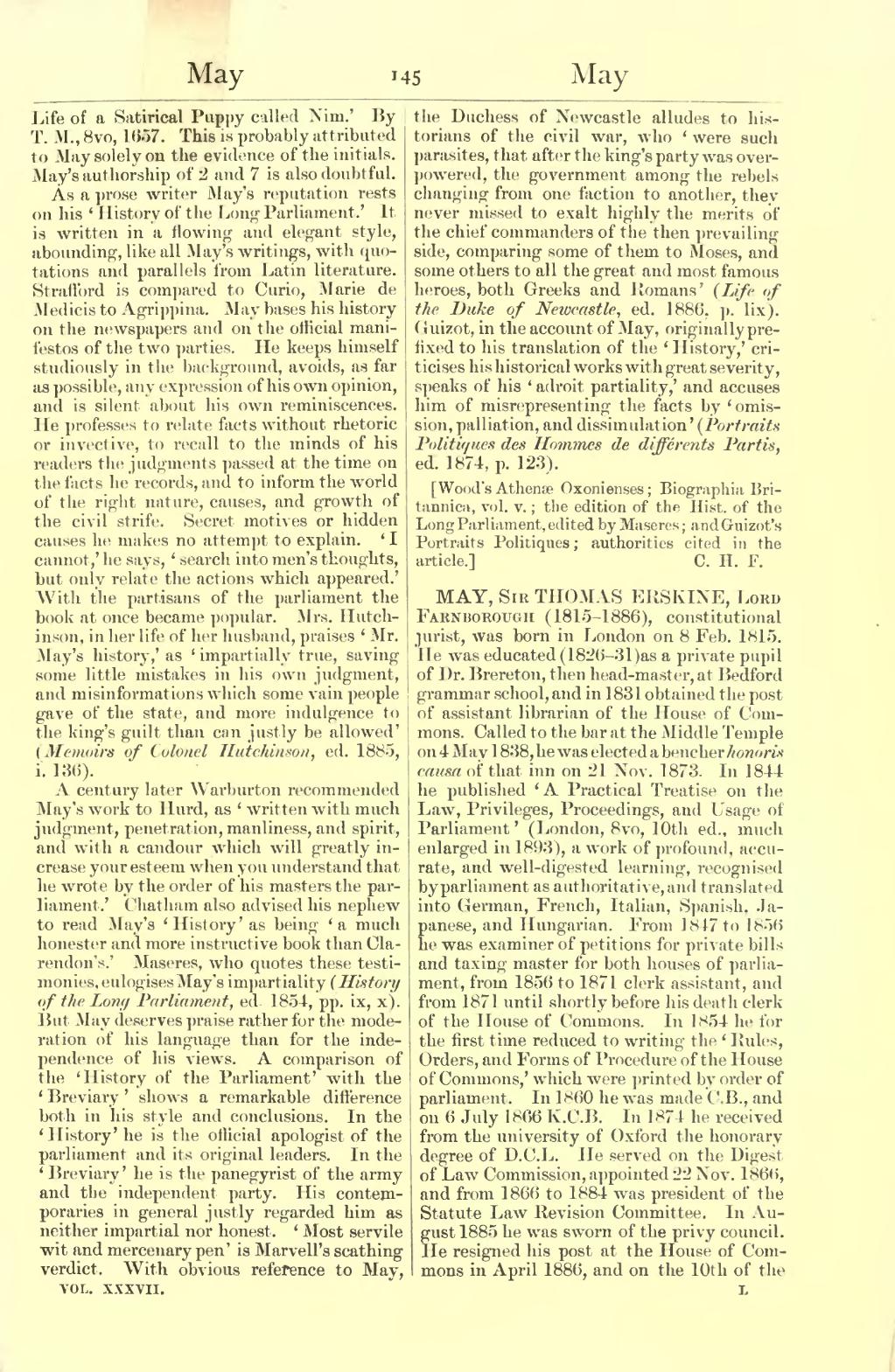Life of a Satirical Puppy called Nim.’ By T. M., 8vo, 1657. This is probably attributed to May solely on the evidence of the initials. May's authorship of 2 and 7 is also doubtful.
As a prose writer May's reputation rests on his ‘History of the Long Parliament.’ It is written in a flowing and elegant style, abounding, like all May's writings, with quotations and parallels from Latin literature. Strafford is compared to Curio, Marie de Medicis to Agrippina. May bases his history on the newspapers and on the official manifestos of the two parties. He keeps himself studiously in the background, avoids, as far as possible, any expression of his own opinion, and is silent about his own reminiscences. He professes to relate facts without rhetoric or invective, to recall to the minds of his readers the judgments passed at the time on the facts he records, and to inform the world of the right nature, causes, and growth of the civil strife. Secret motives or hidden causes he makes no attempt to explain. ‘I cannot,’ he says, ‘search into men's thoughts, but only relate the actions which appeared.’ With the partisans of the parliament the book at once became popular. Mrs. Hutchinson, in her life of her husband, praises ‘Mr. May's history,’ as ‘impartially true, saving some little mistakes in his own judgment, and misinformations which some vain people gave of the state, and more indulgence to the king's guilt than can justly be allowed’ (Memoirs of Colonel Hutchinson, ed. 1885, i. 136).
A century later Warburton recommended May's work to Hurd, as ‘written with much judgment, penetration, manliness, and spirit, and with a candour which will greatly increase your esteem when you understand that he wrote by the order of his masters the parliament.’ Chatham also advised his nephew to read May's ‘History’ as being ‘a much honester and more instructive book than Clarendon's.’ Maseres, who quotes these testimonies, eulogises May's impartiality (History of the Long Parliament, ed. 1854, pp. ix, x). But May deserves praise rather for the moderation of his language than for the independence of his views. A comparison of the ‘History of the Parliament’ with the ‘Breviary’ shows a remarkable difference both in his style and conclusions. In the ‘History’ he is the official apologist of the parliament and its original leaders. In the ‘Breviary’ he is the panegyrist of the army and the independent party. His contemporaries in general justly regarded him as neither impartial nor honest. ‘Most servile wit and mercenary pen’ is Marvell's scathing verdict. With obvious reference to May, the Duchess of Newcastle alludes to historians of the civil war, who ‘were such parasites, that after the king's party was overpowered, the government among the rebels changing from one faction to another, they never missed to exalt highly the merits of the chief commanders of the then prevailing side, comparing some of them to Moses, and some others to all the great and most famous heroes, both Greeks and Romans’ (Life of the Duke of Newcastle, ed. 1886, p. lix). Guizot, in the account of May, originally prefixed to his translation of the ‘History,’ criticises his historical works with great severity, speaks of his ‘adroit partiality,’ and accuses him of misrepresenting the facts by ‘omission, palliation, and dissimulation’ (Portraits Politiques des Hommes de différents Partis, ed. 1874, p. 123).
[Wood's Athenæ Oxonienses; Biographia Britannica, vol. v.; the edition of the Hist. of the Long Parliament, edited by Maseres; and Guizot's Portraits Politiques; authorities cited in the article.]
MAY, Sir THOMAS ERSKINE, Baron Farnborough (1815–1886), constitutional jurist, was born in London on 8 Feb. 1815. He was educated (1826–31) as a private pupil of Dr. Brereton, then head-master, at Bedford grammar school, and in 1831 obtained the post of assistant librarian of the House of Commons. Called to the bar at the Middle Temple on 4 May 1838, he was elected a bencher honoris causa of that inn on 21 Nov. 1873. In 1844 he published ‘A Practical Treatise on the Law, Privileges, Proceedings, and Usage of Parliament’ (London, 8vo, 10th ed., much enlarged in 1893), a work of profound, accurate and well-digested learning, recognised by parliament as authoritative, and translated into German, French, Italian, Spanish, Japanese, and Hungarian. From 1847 to 1856 he was examiner of petitions for private bills and taxing master for both houses of parliament, from 1856 to 1871 clerk assistant, and from 1871 until shortly before his death clerk of the House of Commons. In 1854 he for the first time reduced to writing the ‘Rules, Orders, and Forms of Procedure of the House of Commons,’ which were printed by order of parliament. In 1860 he was made C.B., and on 6 July 1866 K.C.B. In 1874 he received from the university of Oxford the honorary degree of D.C.L. He served on the Digest of Law Commission, appointed 22 Nov. 1866, and from 1866 to 1884 was president of the Statute Law Revision Committee. In August 1885 he was sworn of the privy council. He resigned his post at the House of Commons in April 1886, and on the 10th of the
